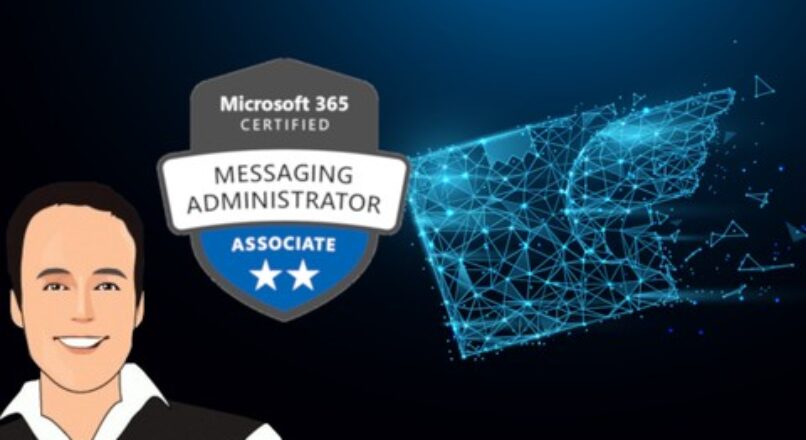
Microsoft 365 Curso de administrador de mensajería MS-203 200,201

Precio: $39.99
Este curso es mucho más que el curso de formación promedio en Udemy! Tener acceso a lo siguiente:
-
This course covers the new MS-203 as well as the older MS-200 and MS-201 exams.
-
Training from a Microsoft Certified Trainer of over 20 años que ha ayudado a miles en su camino hacia la certificación
-
Conferencia que explica los conceptos en un método fácil de aprender para alguien que recién está comenzando con este material.
-
Prácticas dirigidas por un instructor que se pueden seguir incluso si tiene poca o ninguna experiencia
-
Hands on tutorial assignments that can be practiced 24/7 regardless of if you have access to Exchange
-
This course will not only help prepare you for the exam, but we also aim to give you real world knowledge of Exchange 2016, Intercambio 2019, and Exchange Online
TEMAS CUBIERTOS INCLUYENDO MANOS EN LA CONFERENCIA Y TUTORIALES DE PRÁCTICA:
Manage messaging infrastructure lifecycle
-
Plan an Exchange Server installation
-
Understanding Active Directory with Exchange On-Premise
-
Understanding Exchange On-Premise with Exchange Online
-
Preparing Active Directory (ANUNCIO) and Installing Exchange
-
Using the Exchange Administration Center (EAC)
-
(Parte 1)Understanding Powershell with Exchange Management Shell(EMS)
-
(Parte 2)Understanding Powershell with Exchange Management Shell(EMS)
Manage modern messaging infrastructure
-
Working with Microsoft Exchange Databases
-
Considerations for Databases and Logs
-
Using iSCSI for Accommodating Database Storage
-
Implementing iSCSI for Mailbox Database Storage
-
Creating Mailbox Databases
-
Configuring Mailbox Databases
-
Troubleshooting Mailbox Databases
Managing Recipient Resources
-
Understanding Recipients
-
Creating Mailboxes
-
Managing Shared Mailboxes
-
Creating Resource Mailboxes
-
Creating Recipients in Exchange Online
-
Using Powershell to Manage Exchange Online
-
Creating Multiple Mailboxes Using Comma Separated Value (CSV)
-
Managing Mailbox Permissions
-
Creating and managing Security and Distribution Groups
-
Managing Archive Mailboxes
-
Configuring Email Address Policies
-
Evaluating License Options
Manage Role-Based Permissions
-
Understanding Assigning Role
-
Admin Roles with AzureAD
-
Role Groups in Exchange Online
-
Working with RBAC roles for eDiscovery
Managing Mobile Devices
-
Configuring Mobile Device Mailbox Policies
-
Managing Mobile Device Access
-
Mobile Device Access with Exchange Online
Manage Database Availability Groups (DAGs)
-
Understanding and Planning DAGs and Settings
-
Creating a DAG
-
Managing your DAG members and its health
Planning and Managing Organizational Settings
-
Understanding the Global Address List (GAL)
-
Managing the Global Address List (GAL)
-
Understanding the Offline Address Book (OAB)
-
Working with the Offline Address Books (OAB)
-
Configuring Organizational Sharing
-
Managing Add-ins
Managing Public Folders
-
Understanding Public Folders
-
Creating Public Folders in On-Premise Exchange
-
Working with Public Folders in Exchange Online
-
Planning a Public Folder Migration to Microsoft 365
Manage and Implementing Client Access
-
Understanding Client Access Services in Exchange
-
Planning Namespaces for On-Premise Exchange
-
Configuring Virtual Directories and URLs
-
Working with Namespaces in Exchange Online
-
Configuring Client Access Policy Rules
-
Autodiscover in Exchange
-
Understanding Internal and External Certificates
-
Installing a CA for Exchange Certificates
Manage Disaster Recovery
-
Planning Backup and Recovery
-
Implementing and preforming a Backup
-
Performing an Exchange Restoration
Managing Mail Flow Topology
-
Understanding the Exchange Transport Architecture
-
Mail Flow Transport Rules in On-Premise Exchange
-
Mail Flow Transport Rules in Exchange Online
-
Accepted Domains with Exchange On-Premise
-
Domains in Exchange Online
Managing Connectors
-
Understanding Connectors
-
Creating Send and Receive Connectors with Exchange Server
-
Creating Exchange Online Connectors
Managing Compliance
-
Configuring Retention Policies in the EAC
-
Configuring Retention Policies in Microsoft 365
-
Understanding Data Loss Prevention (DLP)
-
Configuring Data Loss Prevention Policies (DLP)
-
Configuring and Analyzing Audit Logs
-
Managing Journal Rules
-
eDiscovery with Litigation, In-Place and Retention Holds
-
Configuring eDiscovery and holds
Planificar y administrar el acceso de los clientes 365 Planificar y administrar el acceso de los clientes (ATP)
-
Advanced Threat Protection Safe Attachments and Safe Links
-
Configuring ATP Safe Attachments and Safe Links
-
Connection Filters
-
Configuring Malware Filters
-
Configuring Spam Filters
-
Managing Protection For Phishing with ATP Anti-Phishing
-
Monitoring Quarantined Items
Planning and Implementing Migrations
-
Cutover Migrations
-
Minimal Hybrid Migrations
-
Full Hybrid Co-Existence Migrations
-
PST, IMAP, and Third-party Migrations
-
Performing a Migration
Troubleshoot mail flow problems
-
Examining Message Trace in Exchange Online
-
Examining Message Trace in O365 Security and Compliance
-
Configuring Message Tracking
-
Analyzing Non-Deliverable Reports (NDRs)
-
Analyze Message Headers with the Remote Connectivity Analyzer
-
Investigating Transport Logs





Deja una respuesta
Debes iniciar sesión o registro para agregar un nuevo comentario .